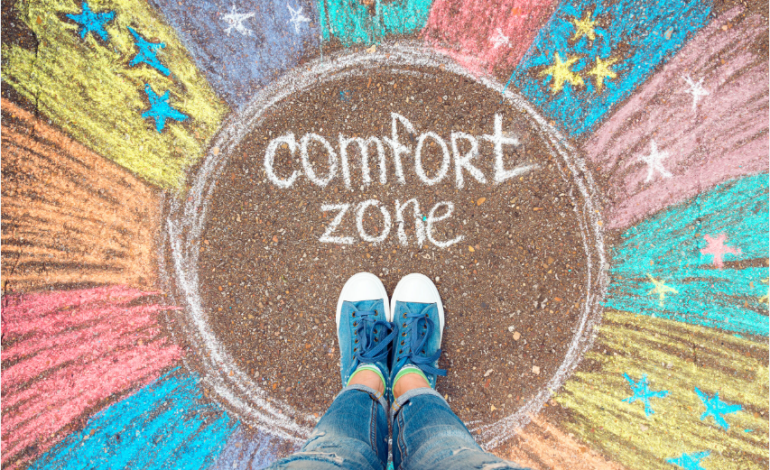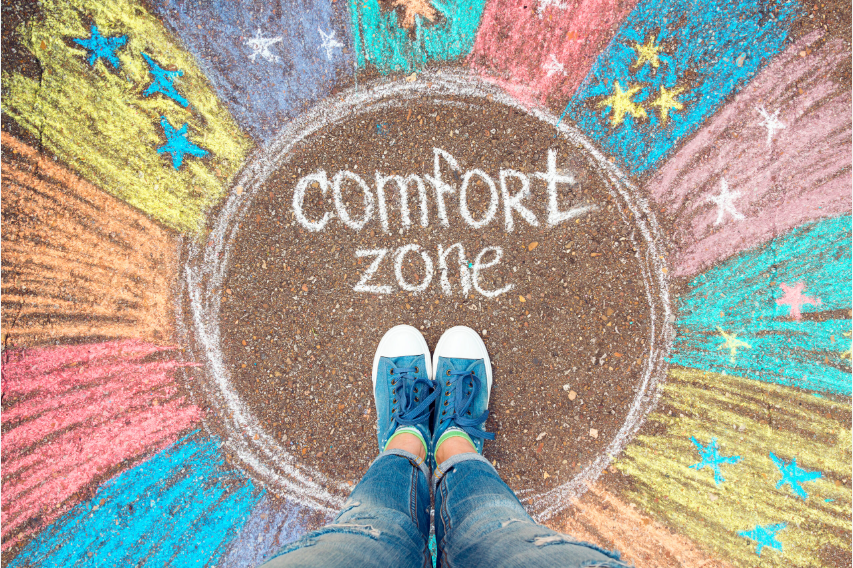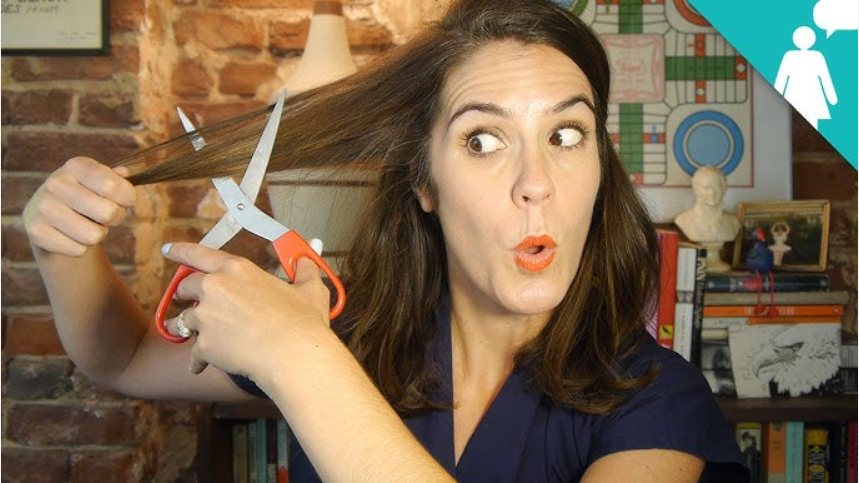
Therapists Share Tips on How to Step Outside Your Comfort Zone

In June 2019, I wrote “ASPIRATIONS” in my journal, underlined and all caps. The first thing I listed was “Handstand, because it’s one of those things I’ve just accepted I’ll never do.” Below that, I added “Scuba dive, because I’m afraid and it’s not something I’ve ever pictured myself doing.” And underneath that: “Finish a story, because it terrifies me.”
Then, nine months later, COVID hit. Sure, I could’ve worked on those goals during lockdown; it wasn’t like I needed to go anywhere to finish my short stories or start practicing handstands. But honestly, I just wasn’t in the right headspace to try new things. The world was full of uncertainty, and I didn’t want to sign up for more. It was all I could do to read my books, binge my shows, and bake banana bread to comfort myself during the chaos of the pandemic.
As the world started reopening, I realized my comfort zone was starting to feel more like a rut. Every time I was faced with a new challenge, like downloading a dating app or reaching out to a friend I hadn’t talked to in a while, I froze. Sometimes that’s fine, like when I’m just not up for a dinner or activity. But other times, I could tell it was fear holding me back.
My therapist explained that this is my anxiety trying to keep me “safe” by keeping me in one place. “It wants to keep you where you are,” she said, “because anything new is scary.” I get it, but I also want out of this cycle. I want to try handstands, scuba diving, and other things I never thought I would. I know my comfort zone has overstayed its welcome, but how do I know when I’m ready to move past it? And if I am ready, where do I even begin? Here’s what mental health experts say.
First, it’s important to realize that your comfort zone isn’t the enemy. It’s easy to blame it for holding us back, but it’s not inherently bad. Everyone has a comfort zone, and it’s okay to stay in it if that’s where you feel safe. Psychotherapist Kelly Neupert points out that society often pressures us to constantly grow, hustle, and push forward, making us feel bad for enjoying peace and comfort. But if you’re genuinely content where you are, there’s no reason to change just because the world says you should.
Clinical psychologist Carla Marie Manly explains that our comfort zones can actually be necessary, especially when life or the world feels chaotic. If being in your comfort zone helps you heal or grow, then it may be exactly where you need to be. There’s no rule that says you have to chase big goals all the time, even though it often feels like everyone else is doing it (spoiler: they’re probably not).
When things began to open up after the pandemic, many people felt pressured to “expand their lives” even if they weren’t ready, says Dr. Manly. If stepping outside your comfort zone causes a lot of anxiety or panic, it might be a sign to stay put for a while, according to psychotherapist Ellie Borden. You shouldn’t sacrifice your mental health just to push yourself out of your comfort zone.
But how do you know when you’re truly ready to branch out? The answer lies in your motivations. Ask yourself whether you’re staying put out of fear of discomfort, or because you’re genuinely happy with where you are. If fear is keeping you from living a life that aligns with your values, it might be time to step out.
A good way to gauge whether you’re ready is to ask yourself: if you could magically remove the fear and anxiety, would you still want to do this thing? If the answer is yes, then fear is what’s holding you back, not a genuine lack of desire to change. Recognizing fear as the obstacle gives you the clarity to move forward.
Moving out of your comfort zone isn’t easy, and it will be uncomfortable. But experts suggest taking it slow. Psychotherapist Elyse Schunkewitz recommends starting small. You don’t want to push yourself so hard that your nervous system is overwhelmed. If you’re struggling with intense anxiety, it might help to talk to a mental health professional for guidance.
Here’s how to move forward:
- Accept the Fear: It’s part of the process. Don’t try to push away discomfort. Instead, reframe it in your mind: “I know this will be uncomfortable, and I can handle it.”
- Challenge Your Brain: Our brains are wired to avoid uncertainty, which is why stepping outside our comfort zone feels so scary. But remember, the threat your brain perceives is often exaggerated. Try to step back and put things in perspective: is this really as terrifying as it seems?
- Work Toward a Long-Term Goal: Break down a big goal into smaller, achievable steps. For example, if you want to start dating, begin by researching dating apps, then try downloading one and creating a profile. Completing small steps will help you build confidence and make the larger goal feel more manageable.
There are incredible experiences, places, and people waiting outside your comfort zone, but finding the courage to get there takes time. By taking small steps, gaining perspective, and accepting fear, you’ll be better prepared for what lies beyond your comfort zone. Trust yourself: if there’s a part of you that’s ready for change, listen to it.





